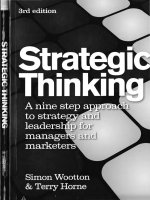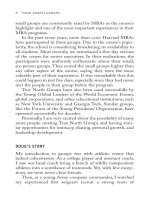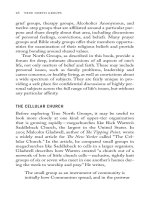True North Groups A Powerful Path to Personal and Leadership Development BK Business_10 doc
Bạn đang xem bản rút gọn của tài liệu. Xem và tải ngay bản đầy đủ của tài liệu tại đây (369.85 KB, 17 trang )
NOTES
. Mary Oliver, “The Summer Day,” New and Selected Poems (Bos-
ton: Beacon Press, ), .
. Robert D. Putnam, Bowling Alone: e Collapse and Revival of
American Community (New York: Simon & Schuster, ), .
. John T. Cacioppo and William Patrick, Loneliness: Human Nature
and the Need for Social Connection (New York: W. W. Norton &
Company, ), –.
. Bruce W. Tuckman, “Developmental Sequence in Small Groups,”
Psychology Bulletin (): –.
. Malcolm Gladwell, “The Cellular Church,” e New Yorker, Sep-
tember .
. Conversation between Willow Creek Community Church
Senior Pastor Bill Hybels, Willow Creek Leadership Summit
Executive Director Steve Spoelhof, and Bill George, South Bar-
rington, Illinois, May , .
. Abraham H. Maslow, Motivation and Personality (New York:
Harper, ).
. Daniel Goleman, Working with Emotional Intelligence (New York:
Bantam Dell, ).
. E-mail from Daniel Goleman to Bill George, January , .
. David Gergen, “Introduction,” in True North: Discover Your
Authentic Leadership (San Francisco: Jossey-Bass, ).
. Student fi eld research study by Amanda Levary, Katie Shaw, and
Ira Nobel, under the supervision of Professor Bill George, Har-
vard Business School, Boston, April .
. See />
BIBLIOGRAPHY
Block, Peter. Community. San Francisco: Berrett-Koehler, .
Cacioppo, John T., and William Patrick. Loneliness: Human Nature
and the Need for Social Connection. New York: W. W. Norton &
Company, .
Leider, Richard. e Power of Purpose: Creating Meaning in Your Life
and Work. San Francisco: Berrett-Koehler, .
Leider, Richard, and David Shapiro. Repacking Your Bags. San Fran-
cisco: Berrett-Koehler, .
McBride, Neal F. How to Have Great Small-Group Meetings. Colo-
rado Springs, CO: NavPress, .
Miller, James E. Eff ective Support Groups. Fort Wayne, IN: Willow-
green Publishing, .
Palmer, Parker J. A Hidden Wholeness. San Francisco: Jossey-Bass,
.
Putnam, Robert D. Bowling Alone: e Collapse and Revival of Ameri-
can Community. New York: Simon & Schuster, .
Stanley, Andy, and Bill Willits. Creating Community. Sisters, OR:
Multnomah Publishers, .
ACKNOWLEDGMENTS
Doug Baker says:
Just as there are no self-made people, no book is a solo eff ort.
In my case, the numerous relatives, coaches, teachers, col-
leagues, clients, and partners over the years who helped teach
and guide me are legion. At the top of the entire cast are my
wife, Carole, and our family. Of particular note are the people
in my various groups and teams. My eternal gratitude goes
out to one and all.
Bill George’s deep and long friendship has been an
important facet of my life. Working together on this proj-
ect has been most rewarding. Bill is an excellent teacher who
willingly and quickly shares his wisdom.
Jane Leyden Cavanaugh is a treasure whose deep and
incisive interviews provided many of the quotes and sto-
ries in this book. In so many ways, she has made this jour-
ney a joy.
Key contributors are all those interviewed for this book
who are listed in the research section. We are grateful for
their time and the wisdom they shared.
Steve Piersanti and his marvelous associates at Berrett-
Koehler have made this venture educational, interesting, and
enjoyable. My hat is off to them all. Four of BK’s authors
were very helpful in providing reviews of a later draft, which
were very valuable.
Richard Leider, who put us in touch with BK. His fore-
word is a wonderful addition to this book.
To George Johnson for encouraging me to keep on with
this project when things looked dark.
My colleagues Carrie Johnson and Sharon Thorson, who
are helping with the development of the True North Groups
Institute.
In addition to the members and facilitators in our groups,
others whose ideas, suggestions, and eff ort have been most
helpful include Elise Bohaty, Dennis Coyne, Karla Ekdahl,
Barry Fernald, David Kamminga, Fred Kiel, Susan Kinder,
Laura Kinkead, Craig Neal, Patricia Neal, Stacy O’Keeff e,
Carol Pine, Dan Rudd, Jim Smith, Dan Sundin, Diane
Weinhold, Arwen Wilder, and Wilson Yates.
Many thanks,
Doug
Bill George says:
I am grateful to my wife, Penny, for all her encouragement,
insights, and editing of this book, without which it would
not have been possible. I also express my deep gratitude to
the members of my men’s group
—
John Cuningham, Chuck
Denny, Peter Gillette, Jonathan Morgan, Tom Schaefer, and
Ron Vantine
—
and our couples group
—
Carole Baker, Polly
and Bob McCrea, and Cindy and Tad Piper
—
from whom I
have learned so much about being a constructive member of
their groups and who have provided so much love and car-
ing as we have journeyed together down life’s path for more
than thirty years.
My coauthor, Doug Baker, was a treasure to work with,
as I have learned so much from him about group pro-
cess and leadership over many years. Jane Leyden Cava-
naugh did a superb job in conducting many of the interviews
of group members and providing useful insights about her
group experiences. Along with Doug, I want to express my
appreciation to Richard Leider for his thoughtful foreword.
I am most grateful to my Harvard Business colleagues
Dean Nitin Nohria, Rob Kaplan, Scott Snook, and Joshua
Margolis for their insights and eff orts in teaching Authentic
Leadership Development with me and for making the six-
person Leadership Development Groups so eff ective. Diana
Mayer at New York University, Bill Gunn and Terry Blum at
Georgia Tech, and Iris Bonnet at Harvard Kennedy School
have demonstrated that this process is transportable and
replicable.
We received great support and insights from Steve Pier-
santi and his team at Berrett-Koehler, along with the book’s
reviewers, which included my good friend Ben Beaird. My
offi ce manager, Diane Weinhold, provided incisive edit-
ing and constructive suggestions for the book, along with
excellent support from Kathy Farren, Dan Sundin, Stacy
O’Keeff e, and Caitlin Weixel.
I also want to express my appreciation to all the people
who shared with us about their groups in the interview pro-
cess, whose quotes make up such an important part of this
book.
My sincere thanks to all of you,
Bill
INDEX
aspirations, –
Authentic Leadership,
Authentic Leadership Develop-
ment, –, –
beliefs, ,
imposing,
judging others,
as topic,
bonding
confi dentiality and,
as criterion of success, ,
human need,
life stories and,
new members and,
religious groups and,
retreats and,
trust and, , –,
boundaries, –
See also intimacy
Bowling Alone (Putnam),
Cacioppo, John,
commitment, , , –
community service, –
confi dentiality
agreement, ,
breach of, –
as norm,
trust and, , –,
confrontation
bonding and,
dominating behaviors and,
–
inability, ,
norms and,
crucible, –, –
curriculum
additional, –
developing, –
start-up, –
See also topics
Darwin, Charles,
disagreements,
discussion, –
See also curriculum; topics
dogmatism, –
dominating behaviors, –,
eff ectiveness, measures of,
See also groups, success of
emotional intelligence, –
empowering others,
See also leadership
facilitation, –
guidelines, –, –
importance of, ,
peer, –, , –
permanent, , –
professional, –, –
feedback
contract,
as criterion of eff ectiveness,
leadership and, , , ,
nonjudgmental, ,
as norm,
personal development and,
–, , ,
process, –
regular,
retreats and,
self-awareness and,
start-up and,
Finding Your True North, ,
forming, , –
disagreements in,
fi rst meeting, –
issues in, –
leading and, –
logistics, –
openness and intimacy, –
in other settings, –
selecting members, –
topics for, –
gender, –,
Gergen, David,
Gladwell, Malcolm, –
Goleman, Daniel, ,
groups
affi nity, , –
assessment of, , –
benefi ts of, , –, –
chemistry, –, –,
– (see also
bonding)
contract, , , , –
defi ned, xiii, –
disbanding, –
essence of, , –,
essential ingredients of, ,
–
geographically dispersed,
logistics, – (see also
meetings)
in other settings, –
retreats, , –, –
size, –,
stages, – (see also forming;
norming; storming;
performing; reforming)
success of, , , (see also
satisfaction)
types of, –, , –
Harvard Business School, –,
–, –
Hybels, Bill,
integrated life, –
intellectual discussions
as avoidance, , , ,
–
facilitator and, ,
introspection and,
personal questions and,
intimacy
as criterion of success,
degree of,
diff erences and, –
forming groups and, –
trust and, , –
See also boundaries; openness;
trust
leadership, , –, ,
See also facilitation
learning,
See also personal development
life experiences, –,
See also stories
life purpose, –
feedback, (continued)
listening
contract,
dominating and,
as facilitator, , ,
feedback and,
nonjudgmental, , , ,
–
as norm, , , ,
self-awareness and, xi
skill in, ,
Loneliness (Cacioppo and
Patrick),
losing your way, –
See also crucible
Maslow, Abraham, –
meetings
attendance, , –,
formats, –
initial, , –
logistics, –
as norm,
members
adding, –, , –
candidate biography,
loss of, –
reforming and, –, ,
selecting, , –,
needs, hierarchy of, –
norming, , –
norms
adhering to, –, –,
–
changing, –
defi ned,
developing, –
listed, , –
openness
based on trust,
benefi ts of,
contract,
as criterion of success,
degree of,
forming group and, –
lack of, –
as norm,
personal questions and,
See also intimacy; trust
passions and motivations,
–
Patrick, William,
performing, , –
assessment, –
attendance and, –
chemistry and, –
essential ingredients, ,
–
facilitation and,
norms and, –
retreats and, –
topics and, –
trust and,
personal development, –,
–,
problem solving, –
Putnam, Robert,
questions, –, ,
See also curriculum, start-up
reforming, –, –
adding members, ,
process for,
reasons for, –
relationships and support,
rituals, –
Saddleback Church,
satisfaction
bonding and,
group renewal and, –
survey of, , –
See also groups, success of
self-actualization, –
self-awareness, –, , –
self-compassion, –
social media,
stories, , , –, –
storming, , –
adding members and, –
boundaries and, –
commitment and,
confi dentiality and, –
dogmatism and, –
intellectualizing and,
norms and, –
openness and, –
trust and,
talents and capabilities,
e Tipping Point (Gladwell),
–
topics
additional, –
choosing, –, –
start-up, –, –
See also curriculum
True North, , ,
trust
as basis of groups, , –,
bonding and, –, –
check in and,
confi dentiality and, , –,
contract,
degree of, –
loss of, , , –
as norm,
retreats and,
See also intimacy; openness
Tuckman, Bruce,
Utne Reader,
Utne, Eric,
values,
bonding and,
examining, –
imposing,
as norm,
storming and, , –
as topic, , ,
Warren, Rick,
Williams, Kathryn,
Willow Creek Community
Church,
Working with Emotional Intelli-
gence (Goleman),
Young Presidents’ Organization,
–
ABOUT THE AUTHORS
BILL GEORGE
Bill is professor of management prac-
tice at Harvard Business School, where
he has taught leadership since . He
is the author of four best-selling books:
True North, Authentic Leadership, Find-
ing Your True North, and 7 Lessons for
Leading in Crisis.
He is former chairman and chief
executive offi cer of Medtronic. He joined Medtronic in
as president and chief operating offi cer, was CEO from
to , and served as board chair from to . Ear-
lier in his career, he was executive vice president of Honey-
well, president of Litton Microwave Cooking Products, and
served in the U.S. Department of Defense as special assistant
to the Secretary of the Navy.
He currently serves as a director of ExxonMobil and
Goldman Sachs, and recently served on the boards of Novar-
tis and Target Corporation. He is a trustee of the Carnegie
Endowment for International Peace, the World Economic
Forum USA, and Tyrone Guthrie Theater.
Bill was named one of Top Business Leaders of the
Past Years in by PBS; Executive of the Year
by the Academy of Management; and Director of the Year
– by the National Association of Corporate Directors.
He has made frequent appearances on television and radio,
and his articles have appeared in BusinessWeek, The Econo-
mist, Fortune, Harvard Business Review, The New York Times,
The Wall Street Journal, and other publications.
He received his BS in industrial engineering with high
honors from Georgia Tech and his MBA with high distinc-
tion from Harvard University, where he was a Baker Scholar.
He holds honorary PhDs from Georgia Institute of Tech-
nology, St. Thomas University, and Bryant University.
Bill and his wife, Penny, reside in Minneapolis and Bos-
ton. They have two sons: Jeff George, who lives in Munich,
Germany, with his wife, Renee Will, and daughter, Dylan;
and Jon George, MD, who lives in San Francisco with his
wife, Jeannette Lager, MD, and son, Freeman.
Bill’s Web site is billgeorge.org and his Twitter address is
@bill_george.
DOUG BAKER
There have been fi ve major arcs in
Doug’s life that weave together to give
meaning to his involvement in the cre-
ation of this book.
The fi rst arc, in the corporate world,
began after he received his undergradu-
ate degree from the University of Texas
and his MBA from the Stanford Grad-
uate School of Business. As a marketing manager at the
Pillsbury Company, he was exposed to organizational and
leadership development concepts that led him to adopt this
work as his career focus.
After several years as Pillsbury’s director of training, he
began his second arc in joining a consulting fi rm, where he
gained further profi ciency in developing teams into highly
eff ective groups. In parallel, his teaching arc began with posi-
tions at Gustavus Adolphus College and the University of St.
Thomas (St. Paul).
His consulting practice led him to join a former client,
Litton Microwave Cooking Products, where he served as
vice president of human resources while Bill George was
president. This was followed by another period of consult-
ing with a wide range of organizations, including M, Con-
trol Data, Dain Bosworth, First Bank System, Honeywell,
Investors Diversifi ed Services, and the state of Minnesota.
In all these assignments, emphasis was on improving organi-
zational eff ectiveness through eff ective leaders working well
together as teams.
The corporate arc surfaced for the last time when he
joined American Express Financial Advisors (successor to
Investors Diversifi ed Services) as senior vice president of
human resources. After twelve years, he returned to his prac-
tice of consulting, executive coaching, and mentoring. His
consulting work focused on team and executive eff ectiveness.
During this time he coauthored Twelve-Step Wisdom at Work
and wrote articles for magazines and newspapers.
Concurrently, his teaching as an executive fellow in the
University of St. Thomas Opus College of Business grad-
uate program led to becoming a moderator of the Aspen
Great Books Seminar. He cofounded the Legacy Center,
which provides seminars and educational materials encour-
aging people to leave their stories, values, and acquired wis-
dom for their successors.
During the past decade, Doug has developed Conversa-
tions of Consequence, helping leaders in their communities
to form groups using the True North Groups model. Now he
is forming the True North Groups Institute to assist individ-
uals and organizations developing these groups and to pro-
vide advice to existing groups.
A fourth arc has been service to the community as he has
served on numerous educational, arts, business, and non-
profi t boards.
The fi nal arc is Doug’s family, which consists of his wife,
Carole; their son, Doug, Jr., his wife, Julie, and their three
children; his daughter Julia McLean and her four children;
and his daughter Susan Winkelmann, her husband, Ed, and
their three daughters.
THE TRUE NORTH GROUPS INSTITUTE
Support for Your True North Group
one of our goals in writing this book is to
encourage widespread formation of True North Groups. To
support you in this process, we have established the True
North Groups Institute to provide assistance to organiza-
tions and individuals who want to form a True North Group
or strengthen their existing group. Institute leaders are avail-
able to provide:
• Facilitation of the formation of new True North
Groups among individuals and within organizations
• Customized True North Group installations
• Help-line support for existing groups wishing to
improve their eff ectiveness
• Speakers for organizations and leaders on the use of
True North groups as a leadership development practice
• A repository for stories of successful groups and the
favorite memories of members
• A registry of professional facilitators to assist in new
group formation
• A registry for people interested in joining a group that
can be shared with similar people in nearby locations
• A source for books, articles, and materials to aid in
group formation and eff ectiveness
To contact us, please refer to our Web site: truenorthgroupsinstitute.com
You may also contact us at:
To contact Bill George about leader ship opportunities, speeches, or semi-
nars, please refer to his Web site, billgeorge.org, or e-mail him at online@
bpgeorge.com.
This page intentionally left blank
Berrett-Koehler is an independent publisher dedicated to an ambi-
tious mission: Creating a World That Works for All.
We believe that to truly create a better world, action is needed at all
levels—individual, organizational, and societal. At the individual level,
our publications help people align their lives with their values and
with their aspirations for a better world. At the organizational level,
our publications promote progressive leadership and management
practices, socially responsible approaches to business, and humane
and effective organizations. At the societal level, our publications
advance social and economic justice, shared prosperity, sustainability,
and new solutions to national and global issues.
A major theme of our publications is “Opening Up New Space.”
Berrett-Koehler titles challenge conventional thinking, introduce new
ideas, and foster positive change. Their common quest is changing
the underlying beliefs, mindsets, institutions, and structures that keep
generating the same cycles of problems, no matter who our leaders
are or what improvement programs we adopt.
We strive to practice what we preach—to operate our publishing
company in line with the ideas in our books. At the core of our ap-
proach is stewardship, which we defi ne as a deep sense of responsi-
bility to administer the company for the benefi t of all of our “stake-
holder” groups: authors, customers, employees, investors, service
providers, and the communities and environment around us.
We are grateful to the thousands of readers, authors, and other
friends of the company who consider themselves to be part of the
“BK Community.” We hope that you, too, will join us in our mission.
A BK Business Book
This book is part of our BK Business series. BK Business titles pio-
neer new and progressive leadership and management practices in
all types of public, private, and nonprofi t organizations. They promote
socially responsible approaches to business, innovative organizational
change methods, and more humane and effective organizations.
Visit Our Website: www.bkconnection.com
Read book excerpts, see author videos and Internet movies, read
our authors’ blogs, join discussion groups, download book apps, fi nd
out about the BK Affi liate Network, browse subject-area libraries of
books, get special discounts, and more!
Subscribe to Our Free E-Newsletter, the BK Communiqué
Be the fi rst to hear about new publications, special discount offers,
exclusive articles, news about bestsellers, and more! Get on the list
for our free e-newsletter by going to www.bkconnection.com.
Get Quantity Discounts
Berrett-Koehler books are available at quantity discounts for orders
of ten or more copies. Please call us toll-free at (800) 929-2929 or
email us at
Join the BK Community
BKcommunity.com is a virtual meeting place where people from
around the world can engage with kindred spirits to create a world
that works for all. BKcommunity.com members may create their own
profi les, blog, start and participate in forums and discussion groups,
post photos and videos, answer surveys, announce and register for
upcoming events, and chat with others online in real time. Please join
the conversation!









